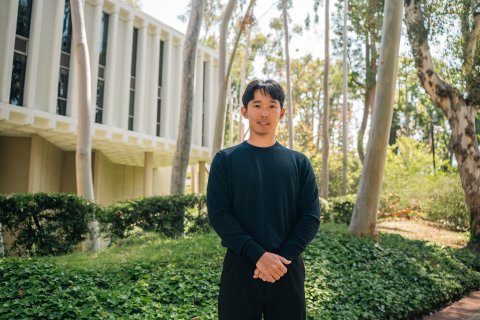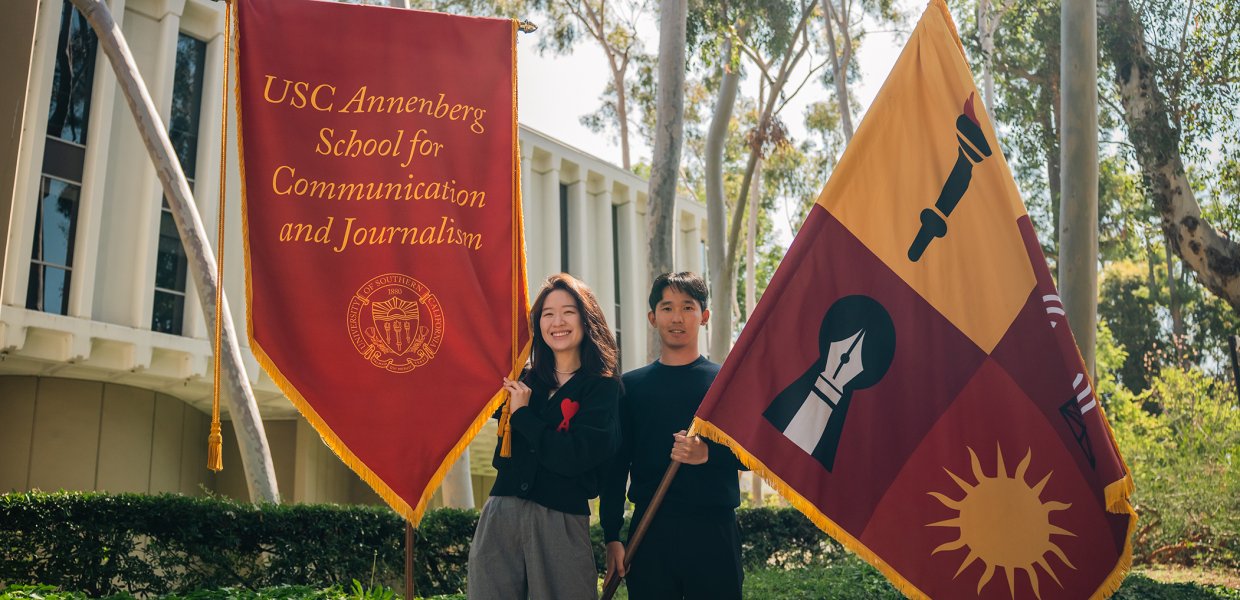Anthony Moon and Ruby Chang’s paths couldn’t be more different. While one is shaped by military service and the other by a deep dive into digital culture — both represent what it means to lead with conviction and curiosity.
As they prepare to lead their peers into the final chapter of their academic journeys at USC Annenberg’s commencement ceremony on May 16, Moon and Chang reflect on the choices, challenges and motivations that shaped their USC Annenberg experience. Their stories highlight how communication, in all its forms, can bridge worlds — from the base to the boardroom, from virtual communities to real-world impact.
Anthony Moon, Flag Bearer

Serving in the Army often meant days- or weeks-long training exercises or duty obligations, but Moon was determined not to put his education on hold. While stationed at Fort Cavazos, TX (formerly Fort Hood, TX), he took classes online and on weekends, and eventually earned his associate’s degree through Central Texas College. “Balancing military service and academics required a lot of discipline,” he said. “But I stayed motivated.”
Moon arrived at USC Annenberg confident that through the Army’s Green to Gold Active Duty Option scholarship and the university’s ROTC program he could complete his college education while remaining on active duty.
“The public relations and advertising program has helped me combine my real-world military experience with a formal education in strategic communication,” he said. “I learned how to translate complex ideas into clear, compelling messages — something that’s essential in any sector, whether it’s corporate, government or military.”
As he prepares to graduate, Moon stands at a unique intersection — soldier, scholar and storyteller — ready to craft narratives that move people and strategies that make an impact.
Tell me about your upbringing. Where did you grow up and what shaped you?
I was raised in an Army household, which meant moving frequently and experiencing a wide range of cultures. I spent my childhood in South Korea, Hawaii, and Washington State. While the constant moving and having to restart my life every few years was a little challenging, I think those experiences helped build my resiliency and appreciation for the challenges I’ve faced when adjusting from the military to USC.
What led you to your current academic path?
At first, my plan was to attend college right after high school. Joining the military was always something I had considered, as I had grown up in that environment, but I wanted to go to college first. However, when the COVID-19 pandemic began and it seemed like the world wasn’t going to return to normal, I decided — why not? While enlisting was different from what I had first planned, my experiences while serving in the military shaped who I am today.
Why did you choose USC Annenberg?
Pursuing a bachelor’s degree was always a priority for me. As a first-generation college graduate, I saw higher education not just as a personal milestone but as a way to set an example for my family and community. During my time in the Army, I became interested in public affairs and the role communication plays in shaping perception and trust, so I decided to pursue public relations and advertising. My family is from Southern California, so I always knew I wanted to attend either USC or UCLA. I chose USC because of the excellent public relations program at Annenberg.
What was the most impactful course or experience you had at USC Annenberg?
PR 450: Building Integrated Campaigns was the most impactful. In this course, I worked with a team on a semester-long project to present to real-world Disney executives. This project was a culmination of everything I had learned while at Annenberg — research, strategy, and presentation skills — in a single, comprehensive campaign. The experience pushed me outside of my comfort zone and showed me what it takes to meet professional standards in real-world communications environments.
How did you build community at USC?
Being part of the Army ROTC program at USC gave me an immediate community of peers with similar values of service and leadership. Beyond ROTC, USC Annenberg’s collaborative projects, networking events, and mentorship opportunities helped me build strong connections. I found that USC students, alumni, and faculty genuinely look out for each other — it’s not just a slogan; the “Trojan Family” is very real.
What does it mean to you to lead the graduate processional at USC Annenberg’s commencement ceremony?
It’s an incredible honor to represent USC Annenberg and lead my classmates into commencement. Carrying the school flag is symbolic of the journey we’ve all taken — the late nights, the teamwork, and the personal growth of everyone graduating. While I may be the bearer, the onus is on all of us to carry the flag.
What are your plans after graduation?
After graduation, I will be returning to the Army as a Second Lieutenant to continue my service. Long-term, I hope to bridge my military experience with a career in public relations
Ruby Chang, Banner Bearer

Long fascinated by how people interact, it wasn’t until graduate school at USC Annenberg that she discovered how that interest could merge with another long-time passion: gaming. “I’ve always been interested in how gaming brings people together, no matter who they are or where they are in the world,” Chang said.
It was during CMGT 551: Communicating Entertainment Media Identities with Monica Koyama, associate professor of professional practice of communication, and adjunct instructor Allan Gungormez that everything clicked. Gungormez, who is chief strategy officer at the entertainment agency MOCEAN, sensed Chang’s enthusiasm and offered her a summer internship at the company, which connected her to another mentor in the industry: USC alumna and senior creative strategist Morgan Monahan.
At USC Annenberg, Chang has combined this real-world industry experience with coursework grounded in theory and practice — giving her the skills to analyze audience behavior, develop cross-cultural strategies, and evaluate the social impact of digital platforms. “The program helped me understand how communication works in virtual spaces, and how brands build communities that feel real,” she said.
Now, as she looks ahead to a career blending communication, culture and technology, Chang is eager to design experiences that foster connection — both online and off.
Tell me about your upbringing. Where did you grow up and what shaped you?
I was born in Taipei and grew up in Shenzhen. We moved a lot because of my dad’s work, so I got used to adapting. I came to the U.S. for high school in Oceanside, and I remember feeling really overwhelmed by the new environment. But over time, I became more confident.
What led you to your current academic path?
I enrolled as a pre-major at the University of Washington and started taking prerequisite classes in business and communication. I noticed that my grades were always better in my communication classes, and I enjoyed those a lot more. That made me realize I’m a relationship-driven person. I like to build meaningful connections so I chose to focus more on interpersonal communication in my undergraduate studies.
Why did you choose USC Annenberg?
I only applied to one graduate school: USC Annenberg. I remember being inspired by an interview I watched with professor Ben Lee on the value of communication. So I chose the communication management program — and thankfully, I got in!
What was the most impactful course or experience you had at USC Annenberg?
Since I was on the STEM track, I only had three electives to choose. I had already planned it out: one for fashion, one for entertainment and one for gaming. I took CMGT 537: The Industry, Science and Culture of Video Games last semester, and it gave me lots of insights into how the gaming industry is working now. I actually used what I learned from the class for an interview. so it's been a really useful class.
How did you build community at USC?
I didn’t realize how amazing the Trojan Family is until I actually experienced it here. My advisor Susan Zhang and professor Ben Lee really guided me with how to connect with people. I think our Trojan Family is really welcoming. Many of our guest speakers are USC alumni and are super willing to help.
What does it mean to you to lead the graduate processional at USC Annenberg’s commencement ceremony?
This means a lot to me. It’s not just about representing the program — it’s about honoring the journey I’ve taken to get here. I’m really proud of what I’ve accomplished, and I’m so thankful for everyone who’s helped me along the way. Carrying the banner feels like a tribute to all of that.
What are your plans after graduation?
I think with communication we’re not limited to one specific role or one specific field; it depends on what field we are interested in. For example, in the last session of my capstone class, professor Mathew Curtis encouraged us to seek out data-related jobs. In other words, he was cautioning us against limiting ourselves and instead urged us to pursue careers across different fields and positions. We have all the soft skills we need, and can continue to build our hard skills on the job. For me, I’m leaning toward project management and game marketing. I had a chance to explore these areas while managing USC Annenberg’s collaborations with Yamibuy and SuperOrdinary in which students help with content creation and strategy.
